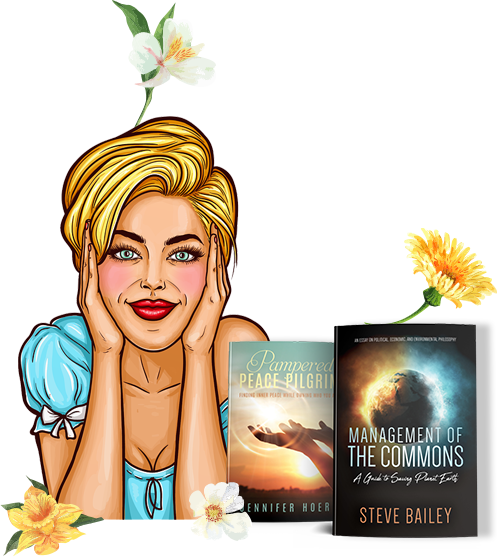Selling Book Rights for a Movie – A Complete Guide for Authors
Publish Your Book View 50% off Pricing
If you’ve ever watched a movie adaptation of a book and thought, “That could be my story on screen someday,” you’re not alone. Many writers and novelists dream of selling book rights for a movie and watching their stories come alive through a film adaptation. Turning a novel into a movie is one of the most rewarding ways to expand your creative reach and earn from your intellectual property. But how do authors actually sell book rights to Hollywood? What’s the real book-to-film adaptation process, who’s involved in a film rights agreement, and how much money can authors make from selling film rights for books or signing a movie option contract? Understanding the steps behind negotiating movie rights, optioning a book for film, and working with producers, studios, and entertainment lawyers is the first step toward turning your story into a cinematic success.
This complete guide breaks down everything you need to know — from understanding film rights and negotiation terms to working with agents, studios, and producers. Whether you’re an indie author or traditionally published, this article will help you navigate the exciting (and complex) world of book-to-film adaptations.
Table of Contents
ToggleWhat Does “Selling Book Rights for a Movie” Mean?
When you sell book rights for a movie, you’re giving someone (usually a producer or studio) the legal right to adapt your story into a film. That doesn’t mean you’re selling your entire book or losing ownership, it means you’re licensing certain rights under specific conditions.
There are two main types of film rights transactions:
a. Option Agreement
This is the most common arrangement. A producer pays you a small fee for the exclusive right to “option” your story — meaning they can try to get a studio, director, or investors interested. The option lasts for a specific time period (usually 12–18 months).
If the movie moves forward, the producer “exercises” the option and buys the full rights. If not, the rights revert to you.
b. Purchase Agreement (Outright Sale)
In a purchase deal, the buyer pays a lump sum for the permanent film rights. You lose creative control and future say in how the story is adapted. This happens less often because studios prefer to test the market through options first.
Understanding the Film Option Process
Most successful book-to-movie deals start with a film option agreement. Here’s how it works step by step:
Step 1: The Approach
A producer, screenwriter, or studio contacts you (or your agent) expressing interest in your book. Sometimes, this happens after your book gains traction, like strong sales, awards, or buzz on social media.
Step 2: The Option Offer
The producer offers to pay an option fee, typically ranging from $500 to $5,000 for indie works, or up to $50,000+ for bestsellers. This gives them exclusive rights to develop a screenplay and pitch to studios during the option period.
Step 3: The Option Period
The producer has a set amount of time (usually 12–24 months) to get the project funded or “greenlit.” During this time, you can’t sell the rights to anyone else.
Step 4: The Option Expiration or Purchase
If the producer successfully secures a deal, they’ll exercise the option and purchase the full film rights, triggering a much larger payment to you — often 5–10 times the option fee, or a negotiated lump sum.
If the option expires, all rights return to you, and you’re free to pursue new offers.
How Much Money Can Authors Make From Selling Book Rights?
This varies dramatically based on your reputation, sales, and the buyer’s budget. But here’s a general breakdown:
| Type of Deal | Typical Range | Description |
|---|---|---|
| Option Fee | $500 – $10,000 | Paid upfront for exclusive rights (1–2 years) |
| Purchase Price | $25,000 – $250,000+ | Paid when movie is greenlit |
| Backend Royalties | 2%–5% of net profits | Rare but possible for high-profile authors |
| Consulting/Screenwriting Fees | Negotiable | If the author contributes to screenplay or creative process |
Example:
A first-time author might get $2,500 for an option and $50,000 when the project is purchased. A bestselling author could receive $100,000–$1 million+ upfront, plus profit participation.
Key Terms in a Film Option Contract
Before you sign anything, you must understand the key clauses in your option agreement. Here are the most important ones:
1. Option Fee
The non-refundable payment for the temporary right to develop the film.
2. Option Period
The time limit (often 12–18 months) during which the buyer can exercise the option.
3. Purchase Price
The total amount due if the buyer moves forward with production.
4. Rights Granted
Clarifies which rights you’re licensing — film, TV, streaming, merchandising, etc. Always ensure only the film rights are being sold unless you agree otherwise.
5. Reversion Clause
States that if the film isn’t made within a certain period, all rights revert back to you.
6. Credit and Royalties
Details how your name will appear in the credits (e.g., “Based on the novel by…”) and whether you’ll receive royalties or bonuses.
7. Creative Involvement
Some authors negotiate the right to review scripts, act as a consultant, or co-write the screenplay.
Should You Hire an Agent or Entertainment Lawyer?
Absolutely — especially if you’re new to film contracts.
A literary agent or film rights agent can help you:
- Evaluate legitimate offers
- Negotiate fair terms
- Avoid predatory deals
- Connect with reputable producers
An entertainment lawyer ensures your contract protects your long-term interests. They’ll explain hidden clauses (like “net profits,” which often means little to no actual payment) and make sure your rights revert if the movie isn’t made.
Agents typically take 10–15% commission from your film earnings, but their expertise is worth it.
How to Attract Movie Producers to Your Book
You don’t have to wait for Hollywood to call — there are proactive ways to get your story noticed.
1. Build Visibility
Producers are more likely to notice books with strong readership. Focus on:
- High Amazon and Goodreads ratings
- Social media presence
- Awards, media features, or viral buzz
2. Pitch Strategically
You can pitch your book directly to production companies, literary managers, or screenwriters who specialize in adaptations. Create a film pitch packet including:
- A logline (1–2 sentence summary)
- Short synopsis
- Character overview
- Comparable films (“in the tone of Matilda meets Encanto”)
3. Attend Book-to-Film Events
Look for events like the Frankfurt Book Fair, Sundance, AFM (American Film Market), or ScriptFest, where producers scout for new content.
4. Hire a Film Rights Agent
Agents who specialize in literary-to-film representation pitch your book directly to producers and studios. They often have industry contacts that authors can’t easily reach.
Real-World Examples of Book-to-Film Deals
Some of the biggest blockbusters started as book deals:
- Harry Potter by J.K. Rowling – Warner Bros. purchased full film rights for over $1 million before the series exploded.
- The Fault in Our Stars by John Green – Fox 2000 acquired rights soon after publication, paying a high six-figure sum.
- Gone Girl by Gillian Flynn – Flynn not only sold the rights but also co-wrote the screenplay, increasing her profit and creative control.
- The Martian by Andy Weir – Self-published online, later sold for six figures and became a Ridley Scott hit starring Matt Damon.
These examples prove that you don’t have to be a mega-famous author to sell your book rights for a movie — you just need a compelling story and smart negotiation.
Protecting Your Work Before Selling Film Rights
Before you pitch your book to producers, make sure your intellectual property is protected.
✅ Register Your Copyright
In the U.S., register your book with the U.S. Copyright Office. In other countries, look for local copyright authorities or WIPO registration.
✅ Keep Written Records
Document all communications, contracts, and negotiation drafts. Email threads can serve as legal evidence.
✅ Use NDAs (Non-Disclosure Agreements)
When sharing manuscripts or scripts, use NDAs to protect your ideas from being copied.
✅ Clarify Adaptation Rights
If you’ve sold publishing rights to a traditional publisher, check your contract. Some publishers retain partial film rights, which means you can’t sell them without permission.
Negotiating Tips for Selling Your Book Rights
- Don’t rush the deal. Producers often move quickly; take time to review the fine print.
- Ask for reversion clauses. Ensure rights return to you if no movie is made within a set timeframe.
- Retain sequel and merchandise rights. Unless you’re paid significantly more, don’t give away everything.
- Negotiate credit placement. “Based on the novel by [Your Name]” should appear prominently.
- Include performance bonuses. You can request extra payments if the film exceeds certain box office or streaming targets.
Can Self-Published Authors Sell Movie Rights?
Absolutely. In fact, self-published authors have landed major film deals — sometimes even faster than traditionally published writers.
Examples:
- The Martian by Andy Weir
- After by Anna Todd
- 50 Shades of Grey by E.L. James
All three began as self-published works that caught the attention of producers due to viral success. If your book gains a strong online following, Hollywood scouts and adaptation agents will notice.
Common Myths About Selling Book Rights
Myth #1: Selling rights means losing your book.
Not true — you’re only licensing film rights, not your entire copyright.
Myth #2: You need to live in Hollywood.
You can negotiate and sell film rights from anywhere, as long as you have legal and agent representation.
Myth #3: Every option deal leads to a movie.
Only a small percentage of optioned books actually get made into films. That’s why it’s crucial to negotiate good upfront terms.
Myth #4: Indie authors can’t sell rights.
Producers are hungry for unique content, and indie authors often have fresh, untapped stories that studios love.
Alternative Screen Adaptation Opportunities
Don’t limit yourself to traditional theatrical films. You can also sell:
- TV or streaming series rights (Netflix, Amazon Prime, Hulu)
- Animated film rights
- Podcast or audio drama rights
- Short film adaptations
Streaming services, in particular, are fueling an unprecedented demand for original content, which means more opportunities for book authors than ever before.
Final Thoughts: Turning Your Story Into a Movie
Selling book rights for a movie can be a life-changing opportunity, both creatively and financially. But it’s also a legal and strategic process that requires patience, negotiation, and professional help.
To recap:
- Understand the difference between options and purchase deals.
- Always involve a literary or entertainment lawyer.
- Protect your copyright and creative control.
- Build visibility to attract producers.
- Negotiate smart — not fast.
Whether your book ends up on Netflix, in theaters, or as a short indie film, remember: you own the source material. Selling film rights is not about giving away your story — it’s about expanding it into new mediums and audiences.
Your next chapter might not be written on paper — it could be playing on the big screen.





